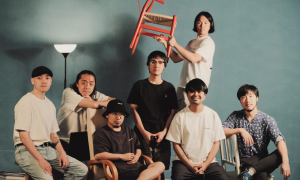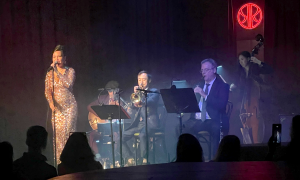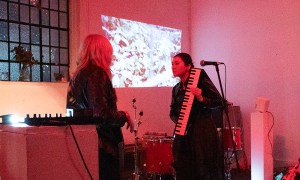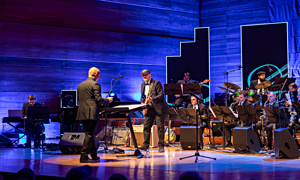Home » Jazz Articles » Live Review » Peakin' at the Beacon 2004: The Triumphant Return of The...
Peakin' at the Beacon 2004: The Triumphant Return of The Allman Brothers Band
The Allman Brothers Band have equalled and arguably surpassed their peers and done their influences proud
There was nary of whit of complacency evident in the band despite the string of successes achieved in 2003. The near-unanimous positive reaction to the studio album Hittin’ The Note released coincidental with last year’s extended March appearance was consolidated by another successful summer tour: by that time, ABB had extended the experimental streak begun in the spring, in part for the sake of the recording of a DVD and the just-released live double-cd One Way Out , the end result of which process has been to render the latter almost(but not quite!) obsolete because the band goes so far afield so often these days.

The three performances near the end of this year’s New York City stint was a case in point. The Allmans were brilliant each night, albeit in a wholly different way, adopting varying approaches of interpretation and innovation that together served as a reaffirmation of the strengths at the core of this great band. These highlights were merely the magnificent moments within nearly ten hours of music spread over the three evenings and did not by any means come at the expense of countless interminable moments of aimless searching for ideas. These days, The Allman Brothers Band is nothing if not focused.
How else to explain the startling sound of Gregg invoking his Southern heritage by singing “The Night They Drove Old Dixie Down”? If you thought Levon Helm seemed to personify a resolute unwillingness to surrender in the face of all odds, hear Allman and think of the trials and tribulations he’s endured in his band’s 35-year history! Then listen to his voodoo incantation of Dr John’s “I Walk on Gilded Splinters”: it was frightening enough to hear his ominous turns of phrase in the verses, but when joined by Warren Haynes and Marc Quinones on the chant refrain, the tune became downright chilling.
The inclusion of such sterling covers wouldn’t be so revelatory if not for the way ABB interwove them into their own repertoire. Tunes long left out of setlists in years past, like “Stand Back” and “Leave My Blues At Home” were totally reinvigorated. Following the shadowy likes of “Splinters” with an airy, bright ten minutes or so of “Ain’t Wastin’ Time No More” was the definition of dynamics. For all the angular, slashing guitars and thundering drums in the Allman arsenal—listen to “Trouble No More” and “Hoochie Coochie Man”—the current band retains a sure touch of restraint and knows when and how to use it to their own ends. Thus, the urgent cover of Derek & The Dominos’ “Why Does Love Got to Be So Sad” turned into high-stepping romp of improvisation led by Rob Barraco on piano; playing with more freedom and abandon than he’s usually given---and clearly urged on in that direction by Haynes—the erstwhile member of The Dead led the Allmans of 2004 on a ride comparable to the most soaring versions of “Jessica” performed thirty years ago.
If you played an interlude of the instrumental passage of that performance for even the most devoted Peachead, they’d be hard pressed to tell the difference between the two eras of ABB. Likewise, to hear Gregg pleading, cajoling, reveling and reviling, by turns, guttural and silken in tone, through the course of an extended “Stormy Monday” was to hear the sound of a man reborn---and perhaps more than one time at that. The depth of feeling in Allman’s singing combined with the command of his voice there and on “Don’t Want You No More”/”Ain’t My Cross to Bear” were a wonder to behold and, on a night when the guitarists to his left were working such magic in rendering definitive versions of band classics like “Whipping Post”(prototypical contemporary blues at its fiercest) and reinventing comparable selections such as “In Memory of Elizabeth Reed,” (now pure majestic jazz tainted only slightly this night by an overlong drums interlude), he virtually stole the show.
And this was March 27th, the night after The Allman Brothers of today engaged in the type of exploratory improvisation that only greatly unified bands will dare to execute, much less bring off successfully. After an opening set that was no more and no less than solid, the tympani rolls of Butch Trucks heralded the entry into “Mountain Jam” where Derek Trucks shone for the deeply intellectual guitarist he is coming to be, patiently embroidering melody lines and uncovering harmonies only he at first can hear. Never content to merely replicate the familiar passages but expand upon the improvisational concept, the performance nevertheless seemed to end too soon but the band’s collective logic, guided by Haynes, unveiled itself as, more than forty-five minutes later, the group rode out an extended coda to a powerful version of “High Cost of Low Living” that morphed back into...”Mountain Jam” again, this time with the bittersweet ending in all its glory. The linkage between eras of Allmans was too clear to miss.
All that said doesn’t mention the giddy sensation of seeing and hearing The Brothers slip into Grateful Dead’s ”Franklin’s Tower” on March 25th, with a beaming Oteil Burbridge taking the lead vocal full of utter delight. Connecting the two great improvisational rock and roll bands of our era seems in retrospect as significant as the group’s previous nods to Eric Clapton and The Band, not to mention the recurring homage to Muddy Waters, highlighted this year in the form of “Can’t Lose What You Never Had.” If The Allman Brothers Band were in some humble way, aspiring to the same heights reached by those artists, they should rest assured they have equalled---and arguably surpassed—their peers and done their influences proud by making music that is never less than stirring and, at its heights of inspiration, genuinely awe-inspiring.
It made for an all-the–more exciting experience each evening to hear the adoring crowd that packed the little theatre. How rare is it for the performances of the band on stage to fully justify the rousing response of their audience? Peakin’ at the Beacon is sublime indeed!
Tags
About Allman Brothers Band
Instrument: Band / ensemble / orchestra
PREVIOUS / NEXT
Support All About Jazz
 All About Jazz has been a pillar of jazz since 1995, championing it as an art form and, more importantly, supporting the musicians who make it. Our enduring commitment has made "AAJ" one of the most culturally important websites of its kind, read by hundreds of thousands of fans, musicians and industry figures every month.
All About Jazz has been a pillar of jazz since 1995, championing it as an art form and, more importantly, supporting the musicians who make it. Our enduring commitment has made "AAJ" one of the most culturally important websites of its kind, read by hundreds of thousands of fans, musicians and industry figures every month.





















